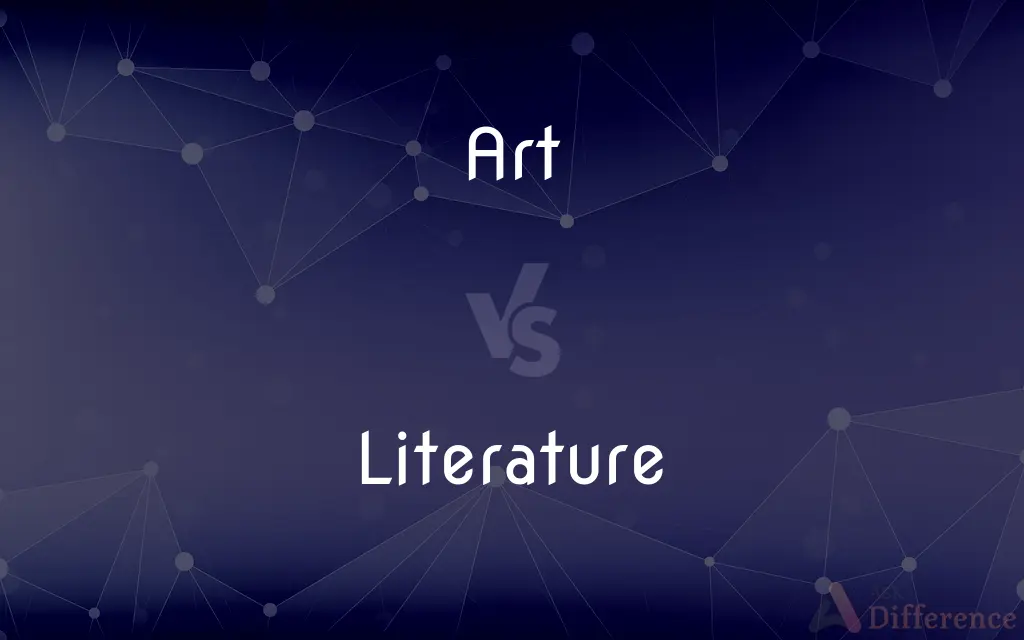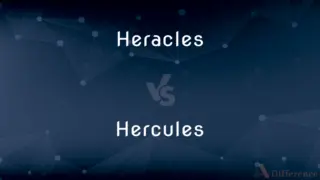Art vs. Literature — What's the Difference?
Edited by Tayyaba Rehman — By Fiza Rafique — Updated on October 1, 2023
Art encompasses a broad range of creative expressions, including visual, auditory, and performance mediums, while literature specifically focuses on written or spoken works, primarily in prose or verse.

Difference Between Art and Literature
Table of Contents
ADVERTISEMENT
Key Differences
Art and Literature both stand as monumental pillars of human expression, each with its unique facets. Art, in its myriad forms, can manifest as paintings, sculptures, installations, music, dance, and more. It is a sensory experience that can be visual, auditory, tactile, or a combination of these. When one thinks of art, they might envision the brush strokes of a painting or the delicate choreography of a ballet.
Literature, while an art form in its own right, is distinctively centered around the power of the written or spoken word. Through literature, authors craft stories, emotions, ideas, and cultures. Whether it's a novel that takes readers to distant worlds or a poem that encapsulates a fleeting emotion, literature is the art of narrative and language.
While both art and literature serve to reflect and shape society, they do so through different lenses. Art might capture a singular moment or emotion and express it without words, while literature delves deep into narratives, building worlds with detailed descriptions and dialogue.
Ultimately, both art and literature are human endeavors to understand, interpret, and represent the world around and within us. They offer insights into the human experience, each with its distinct tools and mediums, yet both equally powerful.
Comparison Chart
Medium
Visual, auditory, tactile
Written or spoken word
ADVERTISEMENT
Forms
Painting, sculpture, music, dance
Novels, poems, essays, plays
Expression
Sensory, often without words
Narrative, language-driven
Interactivity
Can be interactive (e.g., performance art)
Typically static, reader-driven
Purpose
Capture moments/emotions, aesthetics
Convey stories, ideas, cultures, emotions via text
Compare with Definitions
Art
A creative expression using various mediums.
The art gallery showcased diverse styles from around the world.
Literature
A body of written or spoken works.
The literature of the Renaissance period is studied worldwide.
Art
The study and creation of visual works.
She studied art in college and became a renowned painter.
Literature
Written works, especially those with artistic merit.
Shakespeare's plays are a significant part of English literature.
Art
Skill acquired through practice.
The art of negotiation is crucial in diplomacy.
Literature
Printed material on a subject.
The library has extensive literature on botany.
Art
Aesthetic creations that elicit emotions.
The sculpture is a piece of modern art that evokes sadness.
Literature
The art of written works.
Modern literature explores diverse themes and voices.
Art
Art is a diverse range of (and products of) human activities involving creative imagination to express technical proficiency, beauty, emotional power, or conceptual ideas.There is no generally agreed definition of what constitutes art, and ideas have changed over time. The three classical branches of visual art are painting, sculpture, and architecture.
Literature
Textual pieces that represent a culture or era.
Latin American literature offers insights into its rich history and societal changes.
Art
The conscious use of the imagination in the production of objects intended to be contemplated or appreciated as beautiful, as in the arrangement of forms, sounds, or words.
Literature
Literature broadly is any collection of written work, but it is also used more narrowly for writings specifically considered to be an art form, especially prose fiction, drama, and poetry. In recent centuries, the definition has expanded to include oral literature, much of which has been transcribed.
Art
Such activity in the visual or plastic arts
Takes classes in art at the college.
Literature
Written works, especially those considered of superior or lasting artistic merit
A great work of literature
Art
Products of this activity; imaginative works considered as a group
Art on display in the lobby.
Literature
The body of written works of a language, period, or culture.
Art
A field or category of art, such as music, ballet, or literature.
Literature
Imaginative or creative writing, especially of recognized artistic value
"Literature must be an analysis of experience and a synthesis of the findings into a unity" (Rebecca West).
Art
A nonscientific branch of learning; one of the liberal arts.
Literature
The art or occupation of a literary writer.
Art
A skill that is attained by study, practice, or observation
The art of negotiation.
Literature
The body of written work produced by scholars or researchers in a given field
Medical literature.
Art
Arts Artful devices, stratagems, and tricks.
Literature
Printed material
Collected all the available literature on the subject.
Art
Artful contrivance; cunning.
Literature
(Music) All the compositions of a certain kind or for a specific instrument or ensemble
The symphonic literature.
Art
(Printing) Illustrative material, especially in contrast to text.
Literature
The body of all written works.
Art
A second person singular present indicative of be.
Literature
The collected creative writing of a nation, people, group, or culture.
Art
(uncountable) The conscious production or arrangement of sounds, colours, forms, movements, or other elements in a manner that affects the senses and emotions, usually specifically the production of the beautiful in a graphic or plastic medium.
There is a debate as to whether graffiti is art or vandalism.
Literature
(usually preceded by the) All the papers, treatises, etc. published in academic journals on a particular subject.
Art
(uncountable) The creative and emotional expression of mental imagery, such as visual, auditory, social, etc.
Literature
Written fiction of a high standard.
However, even “literary” science fiction rarely qualifies as literature, because it treats characters as sets of traits rather than as fully realized human beings with unique life stories. —Adam Cadre, 2008
Art
(countable) Skillful creative activity, usually with an aesthetic focus.
She's mastered the art of programming.
Literature
Learning; acquaintance with letters or books.
Art
(uncountable) The study and the product of these processes.
He's at university to study art.
Literature
The collective body of literary productions, embracing the entire results of knowledge and fancy preserved in writing; also, the whole body of literary productions or writings upon a given subject, or in reference to a particular science or branch of knowledge, or of a given country or period; as, the literature of Biblical criticism; the literature of chemistry.
Art
(uncountable) Aesthetic value.
Her photographs are nice, but there's no art in them.
Literature
The class of writings distinguished for beauty of style or expression, as poetry, essays, or history, in distinction from scientific treatises and works which contain positive knowledge; belles-lettres.
Art
(uncountable) Artwork.
Sotheby's regularly auctions art for millions.
Art collection
Literature
The occupation, profession, or business of doing literary work.
The origin of all positive science and philosophy, as well as of all literature and art, in the forms in which they exist in civilized Europe, must be traced to the Greeks.
Learning thy talent is, but mine is sense.
Some gentlemen, abounding in their university erudition, fill their sermons with philosophical terms.
Art
(countable) A field or category of art, such as painting, sculpture, music, ballet, or literature.
I'm a great supporter of the arts.
Literature
Creative writing of recognized artistic value
Art
(countable) A nonscientific branch of learning; one of the liberal arts.
Literature
The humanistic study of a body of literature;
He took a course in Russian lit
Art
(countable) Skill that is attained by study, practice, or observation.
Literature
Published writings in a particular style on a particular subject;
The technical literature
One aspect of Waterloo has not yet been treated in the literature
Art
Contrivance, scheming, manipulation.
Literature
The profession or art of a writer;
Her place in literature is secure
Art
The second person singular, indicative mode, present tense, of the substantive verb Be; but formed after the analogy of the plural are, with the ending -t, as in thou shalt, wilt, orig. an ending of the second person sing. pret. Cf. Be. Now used only in solemn or poetical style.
Art
The employment of means to accomplish some desired end; the adaptation of things in the natural world to the uses of life; the application of knowledge or power to practical purposes.
Blest with each grace of nature and of art.
Art
A system of rules serving to facilitate the performance of certain actions; a system of principles and rules for attaining a desired end; method of doing well some special work; - often contradistinguished from science or speculative principles; as, the art of building or engraving; the art of war; the art of navigation.
Science is systematized knowledge . . . Art is knowledge made efficient by skill.
Art
The systematic application of knowledge or skill in effecting a desired result. Also, an occupation or business requiring such knowledge or skill.
The fishermen can't employ their art with so much success in so troubled a sea.
Art
The application of skill to the production of the beautiful by imitation or design, or an occupation in which skill is so employed, as in painting and sculpture; one of the fine arts; as, he prefers art to literature.
Art
Those branches of learning which are taught in the academical course of colleges; as, master of arts.
In fearless youth we tempt the heights of arts.
Four years spent in the arts (as they are called in colleges) is, perhaps, laying too laborious a foundation.
Art
Learning; study; applied knowledge, science, or letters.
So vast is art, so narrow human wit.
Art
Skill, dexterity, or the power of performing certain actions, acquired by experience, study, or observation; knack; as, a man has the art of managing his business to advantage.
Art
Skillful plan; device.
They employed every art to soothe . . . the discontented warriors.
Art
Cunning; artifice; craft.
Madam, I swear I use no art at all.
Animals practice art when opposed to their superiors in strength.
Art
The black art; magic.
In America, literature and the elegant arts must grow up side by side with the coarser plants of daily necessity.
Art
The products of human creativity; works of art collectively;
An art exhibition
A fine collection of art
Art
The creation of beautiful or significant things;
Art does not need to be innovative to be good
I was never any good at art
He said that architecture is the art of wasting space beautifully
Art
A superior skill that you can learn by study and practice and observation;
The art of conversation
It's quite an art
Art
Photographs or other visual representations in a printed publication;
The publisher was responsible for all the artwork in the book
Art
Human endeavor to represent or express life.
Dance is an art that tells stories through movement.
Common Curiosities
Are all written works considered literature?
Not necessarily. "Literature" often implies artistic or intellectual merit, though definitions can vary.
Why is literature primarily text-based?
Literature focuses on narratives, ideas, and emotions conveyed through language.
Can art convey narratives like literature?
Yes, art can tell stories, often through visuals or performances, though in a different manner than literature.
Is literature considered a form of art?
Yes, literature is an art form centered around the written or spoken word.
Can literature be interactive like some art installations?
While typically static, interactive literature, such as "choose-your-own-adventure" books, does exist.
Can art exist within literature?
Absolutely, through illustrative elements or the artful construction of language.
Is the value of art and literature subjective?
Yes, both are often open to interpretation and personal preferences.
Are art and literature connected to a region's history?
Definitely, both offer insights into the historical, social, and cultural contexts of their origins.
How do schools typically differentiate between art and literature?
Schools often teach visual and performing arts under "art" and written/spoken works under "literature" or "English."
Can art be inspired by literature and vice versa?
Absolutely, many artworks are inspired by literary works and many literary works reference or are inspired by art.
Is the purpose of art and literature always to convey beauty?
No, both can explore a range of themes, from beauty to pain, societal issues, or abstract concepts.
Can something be both art and literature?
Yes, a beautifully illustrated book or a song with powerful lyrics can bridge both domains.
How do art and literature influence society?
Both reflect and shape cultural, societal, and personal values and perspectives.
How have digital advancements affected art and literature?
Digital tools have revolutionized how art is created and showcased and have also transformed literature through ebooks, audiobooks, and online platforms.
Can the line between art and literature ever blur?
Yes, especially in interdisciplinary works that seamlessly combine textual and visual/auditory elements.
Share Your Discovery

Previous Comparison
Flexbox vs. Bootstrap
Next Comparison
Heracles vs. HerculesAuthor Spotlight
Written by
Fiza RafiqueFiza Rafique is a skilled content writer at AskDifference.com, where she meticulously refines and enhances written pieces. Drawing from her vast editorial expertise, Fiza ensures clarity, accuracy, and precision in every article. Passionate about language, she continually seeks to elevate the quality of content for readers worldwide.
Edited by
Tayyaba RehmanTayyaba Rehman is a distinguished writer, currently serving as a primary contributor to askdifference.com. As a researcher in semantics and etymology, Tayyaba's passion for the complexity of languages and their distinctions has found a perfect home on the platform. Tayyaba delves into the intricacies of language, distinguishing between commonly confused words and phrases, thereby providing clarity for readers worldwide.
















































